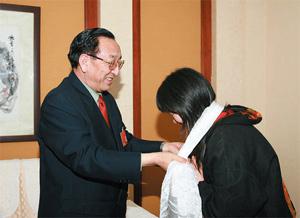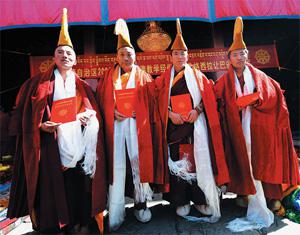The Train Carries Love from the Sunlit City to the Victims
2008-09-25

My last interview of Mr. Leque was when he was the Chairman of the Government of Tibet Autonomous Region (TAR). As time went by, Mr. Leque became the Chairman of the Peoples Congress of TAR. Following the custom, I paid my respects by presenting a delicate Karta whereupon, he gracefully gifted me another in return. Talking and laughing between us put me at ease and then led naturally into my questions.
Reporter: Since the founding of TAR and then through the progression to the implementation of a regional autonomy system for ethnic minorities, TAR has gone through a massive and dramatic change. How does the Peoples Congress of TAR safeguard the self-determination of the Tibetan people and make them their own master?
Leque: TAR is one of the five Chinese autonomous regions for ethnic minorities. The regional autonomy system for ethnic minorities as practiced in this region is the fundamental principle to safeguard the self-determination of the ethnic minorities in China, and it authorizes the power and rights of ethnic minorities to become their own master. Since the launch of the regional autonomy system for ethnic minorities in the snow-capped land in September of 1965, TAR has abolished the feudal serfdom system and made the first historic leap forward. Thereafter, the Tibetan people rode off on their journey to self-determination. In the following decades, Tibetan people, who are mainly ethnic Tibetans, have been fully excising the power and rights offered by this system to enjoy equality with any other people. They not only participate in, administer and manage state affairs, but also control their local and their peoples affairs.
How are these power and rights guaranteed and balanced? What we do is, while we TAR strictly adheres to the national constitution, law and regulations, we fully implement local strategies considered to be safeguarding the power and rights of the local people.

First of all, by working out the local law and regulations, TAR in full scale practices the legislation in order to equip the people to be their own master. The Peoples Congress of TAR and its Standing Committee give full attention to the locality and characteristics of ethnic minorities in order to pragmatically and constantly reinforcing the legislation as practiced in the TAR. Particularly after 1995, the Standing Committee of the Peoples Congress of TAR has issued a total of 255 documents regarding local law, regulations, resolutions and decisions. The Committee achieves this by consistently working in the interests of the local economy, politics, culture, and society in TAR. Through providing a successful service to Tibetan people, the legislation empowers Tibetan people to master their own lives by using the law and law enforcement.

Secondly, TAR applies a legislative supervision system to safeguard the power and rights of Tibetan people. In line with the law and regulations, the Peoples Congress and its Standing Committee at various levels undertakes the role of supervision of the governments practice, the Peoples Procurator and the Peoples Court at both the regional administrative level and levels below it. Within the past five years, the eighth term of the Regional Peoples Congress respectively supervised the implementation of 26 parts of law and regulations within the regional realm, while it deliberately consulted, discussed and finally approved over 40 parts of specific legislative requests. In addition, seven aspects relative to the governmental performance were evaluated. While adopting the strategies of consultation and encouragement of discussion, the Standing Committee has amassed valuable information to enable the law and regulations to be effectively practiced. All comments raised and suggestions have been thoroughly reviewed and then put into effect, resulting in the satisfaction of the masses. In particular, all the activities of governments at different levels are always strictly consistent with both law and regulations and open to public security. With regard to all comments andsuggestions from people during the process, the law and regulations state in detail that the relative organizations and/or departments are obliged to either give feedback or make improvements based on the comments and suggestions. I believe such initiatives reflect the fact that the Tibetan people are empowered to practice self-determination and control their own lives.
Thirdly, in line with the law and regulations, the TAR practices democratic elections, appointment and dismissal of public servants in government office. Such an approach is actually one of the primary means to safeguard the peoples rights. Over 50 years, the Party and the Government have been unremittingly endeavoring to offer ethnic cadres fully fledged training programs. Amongst the contingents of public servants from all over TAR, ethnic Tibetan cadres and other cadres of different ethnic groups respectively account for 93 percent and 73 percent. In addition, the leadership at different levels of government, judiciary, court, procuratorate organizations and the Peoples Congress are always elected in a democratic way and then appointed. For example, during the last five years, the Peoples Congress at the regional level has appointed 832 public servants who are acting at the prefecture level. These public servants are drawn from the people and they willingly devote themselves to serve their people. Of course, they always accept the supervision of and evaluation by their people, too. They are administering and managing local affairs by following the wishes of their people.
Experience shows that the regional autonomy system for ethnic minorities in TAR is an effective way to realise the dreams of Tibetan people to be their own masters via self-determination. Five years ago, in an interview by the media, I commented that to practice the regional autonomy system for ethnic minorities is the best paradigm to manage the affairs of ethnic minorities. In TAR, there is no exception at all. In exercising the system, Tibetan people are intensively and extensively enjoying self-determination. They have in fact become masters of their own destinies.
Law and law enforcement are the sine qua non to safeguard the peoples participation in reform and opening-up and guarantees the people can equally share the outcomes of reform. TAR has been constantly striving to ensure correct practice of law and regulations. For years, TAR has conducted five champions to extend education in public law with the aim to equip the masses with knowledge of the law and regulations and to enable them to be aware that through law enforcement they can retain their own power and rights. By carefully listening to reports from law enforcement organizations, conducting effective supervision, hearing appeals from the public and decisively responding to the suggestions and comments of the people, the Peoples Congress and its Standing Committee has guaranteed the corrective practice of law and regulations in the TAR. These measures safeguard the power and rights of the people to participate in the process of reform and opening-up, and the peoples share in the achievements is ensured.
Reporter: This year, TAR banned exploration for gold and iron sand, and vehicles emitting polluting gases are going to be taxed as well. How does the Peoples Congress of TAR make effective approach to protect the environment of TAR in a scientific way?
Lieque: TAR is a nationally significant shield for the ecological environment that is intimately connected with the interests of all Chinese people and the development of the Chinese nation in the long run. Strengthening measures for environmental protection, TAR has maintained 40 natural reserves and reforests 340 thousand mu(1/15 ha.) of wilderness land. The Standing Committee, in many occasions, has supervised the implementation of law and regulations associated with environmental protection. Within five years, three key champions for environmental protection held the “Chinese National Environment Champaign - Tibetan Action” in which people contributed numerous valuable suggestions and recommendations. The ban on exploration for gold and iron sand in TAR was actually brought to the table by the Peoples Congress of TAR. It is one of the far-reaching measures to maintain a favorable environment for mankind.
The scientific approach to development is the lesson that China learnt from its 30 years of reform. The Peoples Congress of TAR, as the local authorized institution to fulfill both national rights and regional autonomy, adopts the strategy of a scientific approach to guide the supervision of the performance of law and regulations. While stressing economic legislation, TAR also attaches great importance to legislation on environmental protection and the development of social values. In order to speed up and also maintain a high quality of development in both economic and social development, the Standing Committee plans to fulfill an economic and social development strategy, including“upgrading the development of primary industry, emphasizing the core issues of secondary industry, and promoting an accelerated development of tertiary industry.” In addition, it is important to enhance the supervision associated with planning the national economy and social development as well as supervising the financial budgeting system. Meanwhile, it is necessary to conduct a special check on the implementation of planning and infrastructure construction and consistency between economic and social enhancement. Regarding to those key projects, it is always necessary to conduct ad hoc supervision, including deliberately discussing and solving all significant problems. Moreover, we must work hard to promote environmental protection in order to build a safe national ecological shield in TAR.
Reporter: What does the Peoples Congress do with regard to the preservation and development of Tibetan Culture?
Leque: Since 1951, the Central Government has plunged tremendous human resources, capital and material resources into TAR while applying multiple measures including legal, economic and administrative, to preserve and develop the fine culture of ethnic Tibetans. Sequentially, enormous amounts of traditional culture have been carefully preserved and protected. The Peoples Congress of TAR is the main institution to undertake responsibility and accountability for legislationand supervision. In this regard, we have had remarkable achievements. For instance, the Peoples of Congress of TAR has already worked out the “Managerial and Administrative Measures on the Cultural Relics of TAR” in which it explicitly presents rules and regulations for the preservation, utilization, management and administration of cultural relics. The rules and regulations guide law reinforcement organizations at various levels to effectively and efficiently supervise cultural preservation and development. Any infraction of these laws and regulations in this regard will always result in legal action. One example is that, in the year before last, we subjected those criminals who burned and smashed Buddhist statues in Ganden Monastery to legal punishment. Should any problems emerge in the process, we, following the law and regulations, will speak out with our comments and suggestions and supervise pervise the legal entities to improve their performance - aiming to maintain a proper implementation of the task of cultural preservation and development.
In addition, the Peoples Congress and its Standing Committee have already worked out and then amended local regulations entitled the “Regulations on Learning, Applying, and Developing the Tibetan Language”. I would like to say this regulation has been successfully employed in TAR, where it performs a conspicuous function in the application and development of Tibetan language and literature.
Reporter: What do you think about the events happening recently inside and outside TAR?
Lieque: The Olympics is a great event not only for China, but also for the world. The success of the 29th Olympics is a matter of great concern for China as well as a major event for people around the world. I believe almost everyone around the world would like to see a successful Olympics. For those few people holding malicious intent or attempting to further their underlying political ambitions, we should ask them why they want to do this or that. What do they want? I believe their attempt, by both words and actions, to attack and then destroy the Olympics will definitely be condemned and denounced by people throughout the world who have decency and integrity. Those behind these vicious attacks will surely see their m align ambitions finally come to nothing.
Reporter: You have played the roles of the preceding Chairman of TARs Government and the present Chairman of the Peoples Congress of TAR. Of course, you are the one of the policy makers in TAR and also the one to put policies into effect. How do you assess the social and economic reform and openingup of TAR which you have witnessed throughout your lifetime?
Lieque: As one of the Tibetan cadres, I have experienced several significant phases of this history: The first was the era in which Tibetan peoples recreated themselves under the guidance of the first leadership contingent led by Mao Zedong. The second phase is the era of reform, opening-up, and the socialist reconstruction under the second generation of the central government led by Deng Xiaoping. Then, we Tibetan people entered into the third era led by the third generation of leadership, headed by Jiang Zemin. In this phase, we focused on the realization of lifting the living standards of society in TAR. At present, we are at the new threshold ushered in by Hu Jintao. The central leadership contingent has determined the new direction and new milestones in order to foster further stable development.
From the depth of my heart, I believe that it is only because of the Chinese Communist Party that the Tibetan people could escape from a feudal serfdom system that was dark, cruel, brutal, and backward. It is also because of the leadership of the Communist Party that TAR is today becoming a prosperous place. This only took half a century. Since the peaceful liberation, in particular during the 30 years of the reform and opening-up, the Central Government and the State Council have offered TAR rather favorable policies and strategies that fit the locality perfectively. With these achievements, along with full support from all over the hinterland, TAR is enjoying economic development and social progress. The Tibetan people are living a comfortable life. Our Tibetans, without exception, appreciate and are grateful for the special care from the Central Government as well as the care from people living in the big family of the motherland. We are empowered and encouraged because the people of the whole nation back us. We surely believe that the TAR will be facing a flourishing future if we insist on the leadership of the Chinese Communist Party. By taking and focusing on the particular path of Chinese socialism in tandem with the regional autonomy system for ethnic minorities, TAR will be better than ever.
杂志排行
Tibet的其它文章
- The Mountain Summit Auspicious Clouds and Dreams—Recapping the Moment of the Olympic Torch Relay Leg
- The Fraternal Bond between Ethnic Tibetans and the Victims of the Wenchuan Earthquake
- Paljor Lhunpo Today
- Tsakhalho:Salt Production and the Preservation of a Church
- Trees in Lhasa
- Searching for a younger Generation of Tibetan Minstrels toSing the King Gesar
